World
Final Four: Australia makes it through to Women’s World Cup semifinals seeking history for Matildas

AUCKLAND, New Zealand (AP) — There will be a first-time winner of the Women’s World Cup this year, and maybe, just maybe, it will be host country Australia.
The Matildas, serving as co-hosts of the tournament with New Zealand, became the first home team since the United States in 1999 to win a quarterfina l in nine Women’s World Cups. Australia has reached its first semifinal in team history and faces England on Wednesday for a chance to play for the title.
“I genuinely really believe that this team can do great history in so many ways,” Australia coach Tony Gustavsson said, “not just winning football games, but the way that they can inspire the next generation, how they can unite the nation, how they can leave a legacy that is much bigger that football.”
England, the European champion, advanced with a 2-1 victory over upstart Colombia. England also reached the semifinals in 2015 and 2019, only to finish third and fourth and never reach the Women’s World Cup final.
But before the Australia and England showdown, first-time semifinalist Spain takes on powerhouse Sweden on Tuesday in Auckland.
Aside from a 4-0 loss to Japan in group play, Spain has been a force throughout the tournament. It even tuned out an earthquake roughly an hour before its quarterfinal win over 2019 runner-up Netherlands.
The earthquake Friday in New Zealand’s capital of Wellington measured 5.6 on the Richter scale and created minor shaking in and around the stadium.
“We were so concentrated on the game that we didn’t feel it, although we felt some shakes at the hotel the day before,” Spain coach Jorge Vilda said. “The victory of Spain was the earthquake.”
Sweden, meanwhile, is the highest ranked team still in the tournament at second in the world, according to FIFA. The Swedes got into the semifinals by knocking off previously undefeated Japan, the 2011 winners and last remaining champions in the tournament after so many early eliminations of the best teams in women’s soccer.
“I think we have the team to go all the way,” left back Jonna Andersson said, “and now we are one step closer.”
AUSTRALIA
The Matildas advanced after a tense — and electric — penalty shootout 7-6 over France in front of a sold-out crowd in Brisbane, Australia.
It took 20 penalties to decide the winner in the longest shootout in the history of the tournament. It was the game of a lifetime for goalkeeper Mackenzie Arnold, who stepped up to take a penalty with the score at 3-3 but hit the post.
Arnold then managed to twice save shots from French midfielder Kenza Dali, the first being waved off after Arnold was ruled to have come off her line for the first save. Arnold said she was “incredibly disappointed” to have missed her shot on goal and thanked her teammates for keeping the Matildas in the game.
Australia, at 12th in the world, is the lowest-ranked team remaining in the tournament.
Sam Kerr, the injured superstar who missed all of group play, came off the bench against France but ended up playing nearly a full game when the match went to extra time. Kerr converted her penalty kick. And the Australians have also been boosted by the play of 20-year-old Mary Fowler, who has stepped in to fill Kerr’s void in this tournament.
Arnold said the Matildas need a day to regroup before focusing on England.
“I don’t want to ever get ahead of myself, and we’re all the same in that aspect,” she said. “We just take one game at a time, one half at a time, whatever that is, and we just keep getting to the next step every time. So now that we’ve made the semifinal for the first time, we’ll take a moment to process what we’ve actually done.”
ENGLAND
England very much wants to add a World Cup title to last year’s European championship, and coach Sarina Wiegman understands the Lionesses will have their hands full in a semifinal that will be a home game for Australia.
Wiegman’s only loss as England manager in 37 matches was a 2-0 loss to Australia in a friendly four months ago. Now in the semifinals for a third consecutive World Cup, England must beat the home team to advance to its first final.
“It’s going to be really big,” Wiegman said of the semifinal. “It’s probably going to be bigger than I imagined now. I’ll talk to my players and staff and see what that rivalry is. We’ve had such a warm welcome and we’ve really enjoyed our time here in Australia. I really like the people here but that doesn’t mean there’s no rivalry. So we’ll see that Wednesday.”
England already has won in front of a hostile crowd — the 75,784 in attendance for its quarterfinal win over Colombia were mostly clad in Colombian colors — and Wiegman said “we expect a similar crowd for Australia.
“We are really looking forward to it. We know that it’s an away game,” she said. “Let’s try to (use it as) an inspiration.”
England star Lauren James will miss her second consecutive game because of a suspension for receiving a red card in the quarterfinals.
SWEDEN
Sweden’s current team has been labeled the “Golden Generation” of its nation’s history of women’s soccer, but the Swedes have yet to live up to that billing on an international stage.
Now it has knocked off both the United States and Japan to reach the semifinals and a Tuesday match against Spain in Auckland. Sweden nearly won an Olympic gold medal in Tokyo two years ago but lost to Canada in the final, and in the World Cup, the Swedes were runners-up in 2003 and three-time third-place finishers.
A highlight of each Sweden win has been the playing of Swedish band Abba’s songs in the stadiums after the victories, and striker Kosovare Asllani has a request for Tuesday: “I love `Lay Your Love on Me,’” she said.
“It’s so nice when you hear the Abba songs after the game. You can’t help but smile,” she said. “I’m just very proud of the team performance but we’re not satisfied here. Obviously want to go all the way.”
SPAIN
Spain was the first team to secure a spot in the semifinals with a 2-1 win over 2019 runner-up Netherlands in extra time of the quarterfinals.
Just making it to the quarterfinals was a boost for Spain, ranked seventh in the world but had never before advanced to the quarterfinals in its two previous World Cup appearances. But in their third tournament, La Roja have been fantastic.
Spain blew through its first two games of group play before suffering a humiliating 4-0 loss to Japan in the finale. Vilda made a batch of lineup changes for the knockout round, which led to a 5-1 win over Switzerland, and then the quarterfinal upset over the Dutch.
It put Spain on course for a rematch with the Japanese, but they were upset in the second semifinal by Sweden and La Roja now faces the third-ranked team in the world on Tuesday at Eden Park in Auckland.
“We’ve reached somewhere we’ve never reached before, and done it playing a good game as well, with a team that is convinced that we can go even further,” Vilda said. “The rival that we meet and face in the semifinals, it will be one of the best teams in the world.”
Spain and Sweden have never met in the World Cup — Spain didn’t even qualify for the first six tournaments — but played to a 1-1 draw last October in a friendly in Cordoba, Spain.
___
AP World Cup coverage: https://apnews.com/hub/fifa-womens-world-cup

World
Palestinian Authority under pressure amid rising resistance, popularity of Iran-backed terror groups
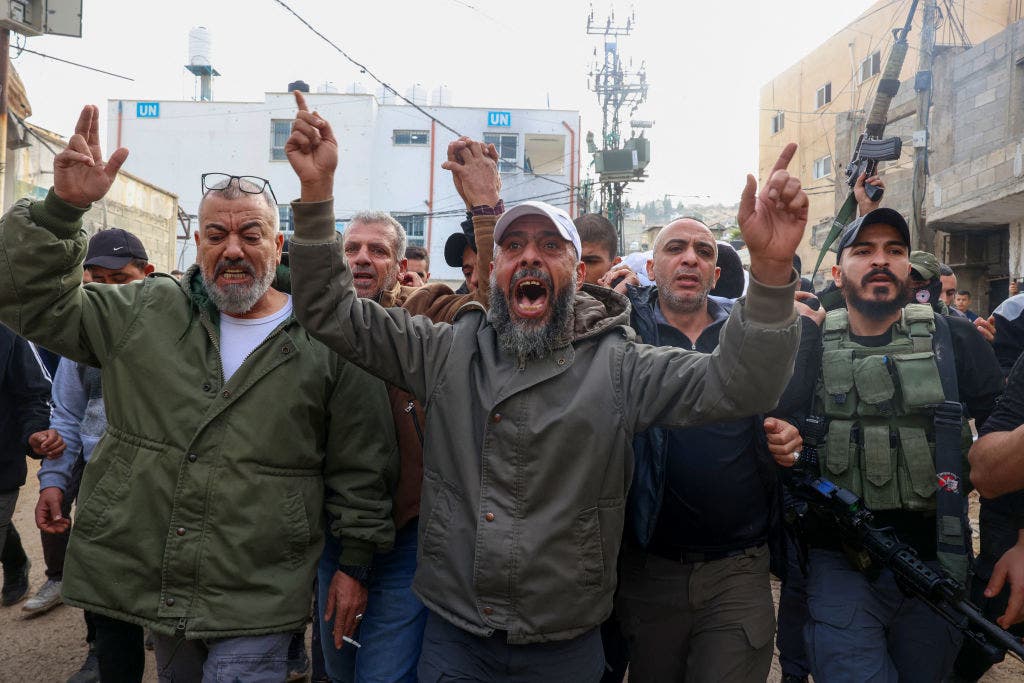
The Palestinian Authority (PA) is facing a growing challenge in the northern West Bank city of Jenin as it launches an ongoing operation against local terror factions supported by Iran, a crackdown that has sparked violent clashes and highlighted the deepening rift between the PA and local communities.
“Iran has been funding militants to buy weapons, and now the Palestinian Authority is acting to stop that. They’ve taken measures to block the money and crack down on the factions. The PA knows Iran will keep supporting Hamas and Islamic Jihad, and this is the challenge they face. It’s the right time to confront Iran, especially after the wars in Gaza and Lebanon- public mood is not welcoming any military confrontation with Israel after what happened,” Mohammad Daraghmeh, Asharq News bureau chief in Ramallah, told Fox News Digital.
The U.S. has reportedly requested Israel’s approval to deliver urgent military assistance to the PA as it intensifies its crackdown on terror organizations in Jenin, Axios reported. The Biden administration is seeking to provide the PA security forces with ammunition, helmets, bulletproof vests, armored cars and other essential items, but needs Israel’s consent to proceed. Historically, U.S. assistance to the PA has ranged between $200 million and $300 million annually. In recent years, especially after the Biden administration took office, there has been a resumption of aid to the PA, following a freeze during the Trump administration.
HAMAS ATTACKER OPENS FIRE AT ISRAELI BUS IN WEST BANK, INJURING AT LEAST 8: REPORT
Mourners shout during the funeral of 19-year-old Rahbi Shalabi, who was killed during clashes between Palestinian security forces and militants a day earlier, in the occupied West Bank city of Jenin on Dec. 10, 2024. (ZAIN JAAFAR/AFP via Getty Images)
“Since October 7th, there has been an increased push from Hamas and Islamic Jihad, with significant Iranian involvement,” said Dr. Michael Milshtein, head of the Forum for Palestinian Studies at Tel Aviv University who further emphasized the shift in the situation since Oct. 7, noting the influence of Iranian-backed forces. “They’re trying to push operations in the West Bank, and there have been attempts to manufacture rockets and fire them at Israeli cities from Jenin. While it’s still in the early stages and these efforts are unsuccessful, it’s a troubling development that signals how Jenin is evolving into a central hub for terrorists.”
Last weekend, PA security forces killed Yazid Jaysa, an Islamic Jihad commander, in an operation that has intensified tensions in the region. This was the third death in Jenin within a week, following the killing of 19-year-old Rahbi Shalabi during gunfights between PA forces and local militants. The deaths have further fueled the discontent in the city, particularly among residents of the Jenin refugee camp. “The entire refugee camp is now against the PA,” said Daraghmeh.
On Sunday, reports surfaced that the PA had positioned its forces outside the refugee camp, but attempts to enter were met with resistance. The terrorists inside the camp, many of whom have vowed to fight the PA’s forces, pose a significant challenge to the PA’s plans for reasserting control.
PALESTINIAN PRESIDENT ABBAS SAYS US IS THE ‘ONLY POWER’ CAPABLE OF ORDERING ISRAEL TO END THE WAR
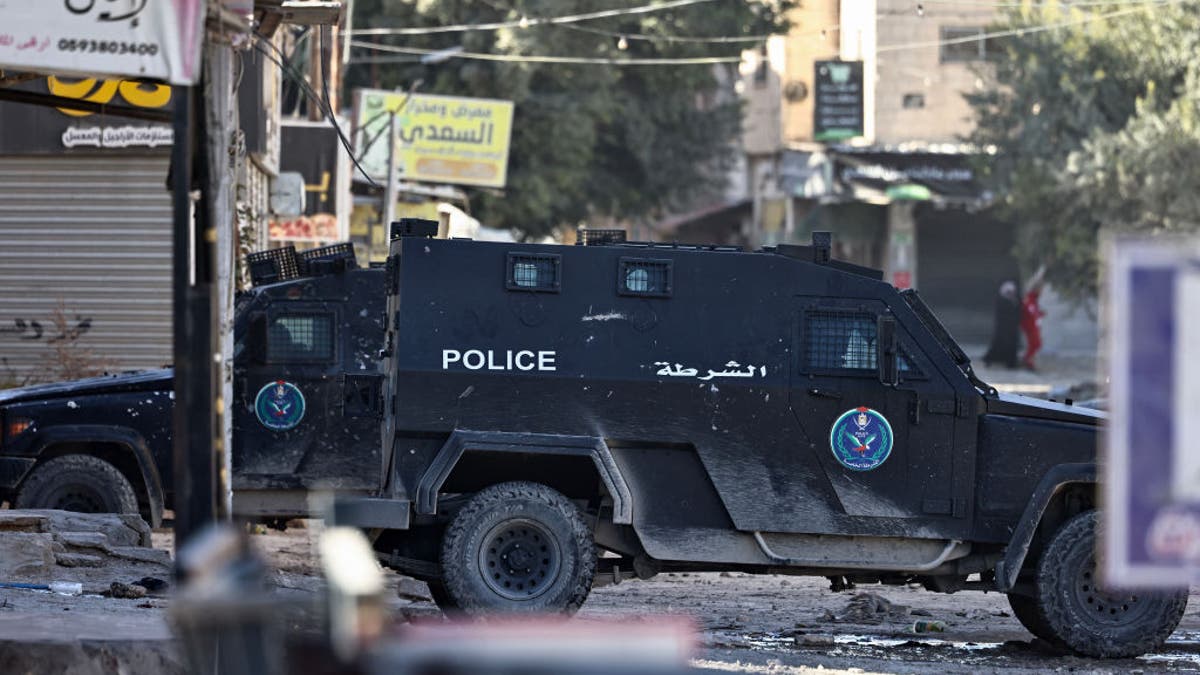
Palestinian Authority security forces vehicles block a road amid clashes with militants in the Jenin camp in the Israel-occupied West Bank on Dec. 15, 2024. For more than a week, the northern West Bank city of Jenin has seen intense violence, after the PA, which coordinates security matters with Israel, arrested several militants. (ZAIN JAAFAR/AFP via Getty Images)
“There’s no active fighting right now, but the PA forces are stuck. They’ve tried to enter, but failed, and now they’re stuck outside,” said Daraghmeh. “They can’t leave, but they can’t continue the operation either, because there are dozens of militants ready to confront them.”
Milshtein, the former head of Palestinian affairs in Israeli Defense Forces military intelligence, told Fox News Digital, “The PA does not have the ability to enforce control in northern Samaria and the surrounding areas. The PA has lost control of these regions, and for years, Israel has treated Jenin and the surrounding areas like Gaza- without PA control mechanisms, and essentially, there’s a real vacuum.”
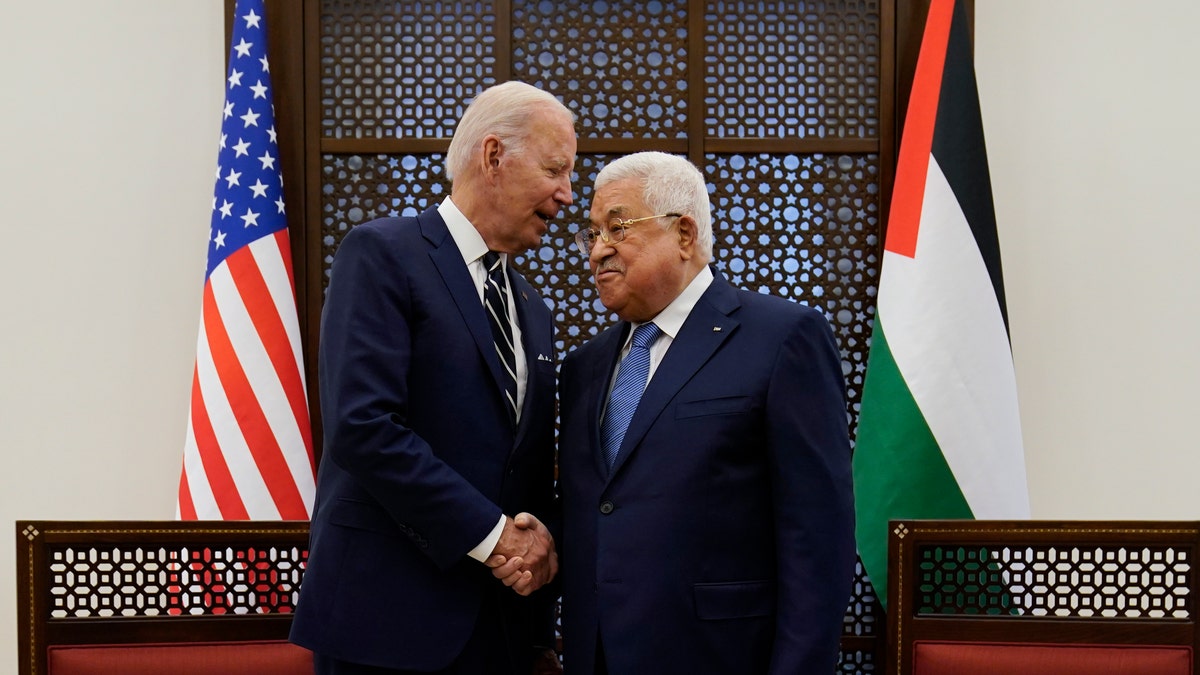
Palestinian President Mahmoud Abbas, right, and President Biden shake hands in the West Bank town of Bethlehem on Friday, July 15, 2022. (AP Photo/Evan Vucci)
The timing of the PA’s operation is significant, with many observers noting that it coincides with the broader regional context, including the ongoing war in Gaza and the fall of Syrian President Bashar al-Assad. Milshtein believes that the events in Syria played a role in the PA’s decision to act. “People in the West Bank say that when one dictator (PA President Mahmoud Abbas) saw what happened to the other (Bashar al-Assad), he decided he would not follow the same fate,” Milshtein explained. “Mahmoud Abbas likely felt that he needed to act before the PA’s authority in the West Bank completely erodes.”
The operation, which is part of a larger crackdown in the northern West Bank, also reflects the PA’s desire to assert itself as a capable authority ahead of potential political developments in Gaza. The PA has long struggled with its ability to govern Gaza, which it lost to Hamas in 2007. Now, with the region in turmoil, it is hoping to prove that it can restore order in the West Bank, which it argues will bolster its legitimacy in any postwar political scenario for Gaza.
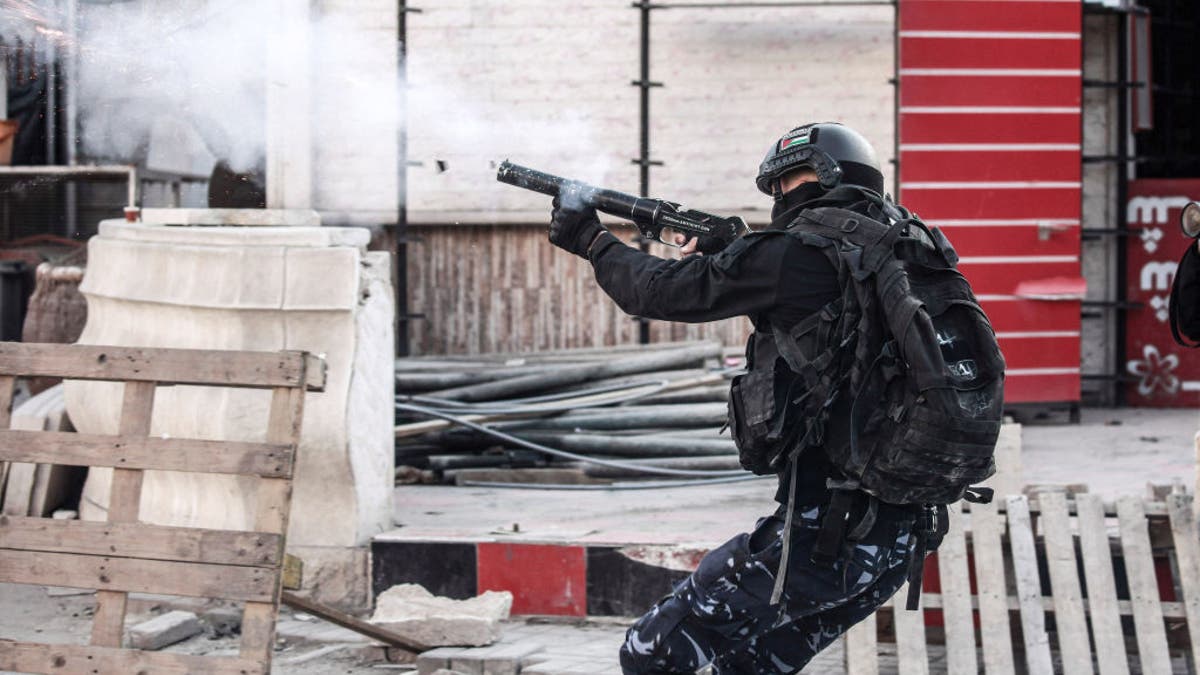
A Palestinian security man fires tear gas at protesters in the center of the West Bank city of Jenin and its camp on Dec. 16, 2024. (Nasser Ishtayeh/SOPA Images/LightRocket via Getty Images)
“I don’t see a possibility that the PA will control Gaza,” Milshtein said, “There are two million people there. For 17 years, they have been ruled by Hamas, and 60% were born after Hamas took control. They were educated to view the PA as collaborators with Israel and enemies. Giving the PA two hours in Gaza is a known failure from the outset.”
Despite the violence in Jenin, Daraghmeh does not foresee the conflict spreading beyond. “People in Ramallah, Hebron and other cities don’t want the West Bank to turn into another Gaza,” Daraghmeh said. “The situation in Jenin is contained, but it remains a test for the PA’s ability to control its own territory.”
World
Can toppled Syrian president Bashar al-Assad be brought to justice?
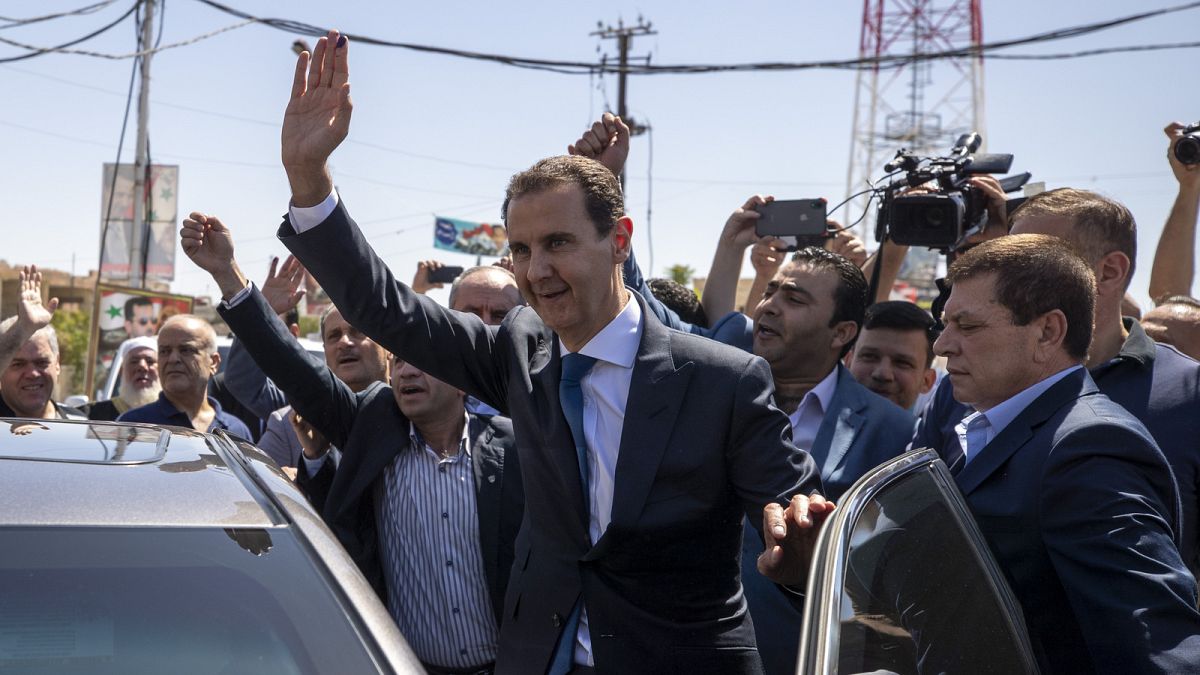
Despite the legal and political barriers to prosecution, human rights experts are optimistic that al-Assad and regime officials could one day be held accountable for their crimes in a court of law.
In Syria, celebrations of the fall of Bashar al-Assad have been mingled with a sense of horror, as gruesome evidence of the atrocities committed by his regime emerge.
Mass graveyards and the infamous prisons that were central to the deposed dictator’s coercive rule have been uncovered.
They bear traces of the brutal suffering inflicted by the regime.
Chaotic scenes of former detainees, their relatives and journalists trawling through paperwork in the detention centres have sparked international pleas on Syria’s new de facto leaders to ensure evidence is preserved for future criminal prosecutions.
Al-Assad and his father, Hafez, have been accused of a litany of crimes and abuses over the past 54 years, including torture, rape, mass executions, enforced disappearances and chemical attacks.
The Syrian Network for Human Rights (SNHR) estimates that at least 15,000 Syrians have been tortured to death since the civil war broke out in 2011.
But with al-Assad in exile in Russia and many of his entourage suspected to be in Iran, there are several legal and political obstacles that stand in the way of criminal accountability.
The Hague-based International Criminal Court (ICC) is the most obvious international court of law for prosecuting individuals for such serious crimes. But the ICC does not have jurisdiction over Syria as the country is not a state party to the court’s treaty, the Treaty of Rome.
The UN Security Council can in principle refer a case to the ICC, granting it jurisdiction. But that would certainly be vetoed by the Kremlin, given its alliance with al-Assad and its own complicity in the crimes.
Both Russia and China blocked such a referral ten years ago.
Speaking to Euronews, Balkees Jarrah, associate director for international justice at Human Rights Watch (HRW) called on Syria’s new de facto authorities to consider granting jurisdiction to the ICC: “We believe Syria’s new leadership should immediately make clear its commitment to justice and accountability,” she said.
“This includes ratifying the Rome Treaty and giving the International Criminal Court retroactive jurisdiction so that the prosecutor can examine crimes committed over the last years.”
All eyes on de facto Syrian leaders
A more viable option in the current political climate is for trials to be held in criminal courts both within and outside Syria.
Experts say it’s too soon to tell whether the new de facto rulers will be able to ensure any Syrian criminal proceedings are carried out safely and in line with international standards.
“We don’t know what the future state of Syria will look like, how the different institutions will work and how well they will cooperate with each other. So this is just something we cannot predict,” according to Elisabeth Hoffberger-Pippan of the Leibniz Peace Research Institute Frankfurt (PRIF).
“The ideal option is to have criminal proceedings in Syria itself that meet fair trial standards, without use of the death penalty. And there is a need to ensure the safety for witnesses and victims to come forward with testimonies,” Vito Todeschini, legal advisor for Amnesty International, told Euronews.
The main rebel group in the new administration is the Hayat Tahrir al-Sham (HTS), designated a terrorist group by the UN Security Council and formerly linked to al-Qaeda.
Its leader, Ahmed al-Sharaa, formerly known as Abu Mohammed al-Jolan, has vowed to “pursue” the regime’s henchmen in Syria and has called on countries to “hand over those who fled” so that justice can be served.
The rebel fighters have also spoken of an amnesty for all military personnel conscripted into service under al-Assad.
But it is currently inconceivable for al-Assad himself to be extradited to stand trial in either a Syrian or non-Syrian court, as there is no political appetite or motive for Moscow to hand him over. Iran is also unlikely to extradite regime officials who have fled there.
Yet, experts consulted by Euronews have expressed hope that al-Assad and the regime’s high-level torturers can one day be held accountable, if the geopolitical conditions change.
“If the sudden fall of the al-Assad regime has shown us anything it is that things can change quite rapidly,” Human Rights Watch’s Jarrah said. “We can’t predict what happens in the future nor preclude the possibility of Assad answering for his crimes one day in a court of law.”
“What we also need to consider right now is how intense and how strong the bond is between Vladimir Putin and Bashar al-Assad,” Hoffberger-Pippan of PRIF said. “I do think that there is a chance Russia might not be as interested in al-Assad in the future because the geopolitical environment is changing in a way that makes it less important for Russia to protect him.”
Calls for international collaboration and preservation of evidence
Universal jurisdiction also allows non-Syrian courts to prosecute Syrians for crimes against humanity, war crimes, and torture.
Criminal cases against regime officials have already been filed in Austrian, French, German, Norwegian, Swedish and US courts, many of which have already successfully pressed charges.
The first international trial on torture in Syria was heard before the Koblenz Higher Regional Court in Germany in 2020. Two former high-level officials of the al-Assad regime were charged, one of whom was found guilty of crimes against humanity and handed a life-long sentence.
In November 2023, a French court issued international arrest warrants for Bashar al-Assad, his brother and two officials over an attack against civilians using chemical weapons in 2013.
According to the Berlin-based European Center for Constitutional and Human Rights (ECCHR), universal jurisdiction carries promise but should be a “fall-back option” if processes within Syria fail.
The push towards justice should be “Syrian-led”, it says.
For any trials, well-preserved evidence is crucial.
During the decades-long regime, offenses were documented by international organisations and Syrian civil society with the help of whistleblowers. The so-called ‘Caesar’ photos, taken by a Syrian military police officer who defected a decade ago, are perhaps the most well-known evidence of torture which has led to criminal proceedings in European courts.
The UN’s International, Impartial and Independent Mechanism (IIIM) has a mandate to collect, preserve and analyse evidence to be used in criminal proceedings and supports Syrian civil society in judicial processes.
Its lead investigator Robert Petit has described “papers strewn all over the floor, people leaving with computers, hard drives burned and smashed” in regime centres during the rebels’ offensive.
“Those in control of these prisons need to safeguard materials in these facilities so that the truth can be told and so that those responsible are held accountable,” HRW’s Jarrah explained.
Euronews reached out to the UN to ask whether its investigators have yet been authorised by Syria’s de facto leaders to gain access to the ground, but has not yet received a reply.
According to the ECHHR, there is also real risk that evidence can be confiscated “to be used as political or commercial capital” or be compromised by secret services agents from countries “interested in destroying evidence and archives.”
World
Zelenskiy, NATO boss and European leaders discuss Ukraine security guarantees

-

 Business1 week ago
Business1 week agoOpenAI's controversial Sora is finally launching today. Will it truly disrupt Hollywood?
-

 Politics6 days ago
Politics6 days agoCanadian premier threatens to cut off energy imports to US if Trump imposes tariff on country
-
/cdn.vox-cdn.com/uploads/chorus_asset/file/25782636/247422_ChatGPT_anniversary_CVirginia.jpg)
/cdn.vox-cdn.com/uploads/chorus_asset/file/25782636/247422_ChatGPT_anniversary_CVirginia.jpg) Technology1 week ago
Technology1 week agoInside the launch — and future — of ChatGPT
-
/cdn.vox-cdn.com/uploads/chorus_asset/file/25789444/1258459915.jpg)
/cdn.vox-cdn.com/uploads/chorus_asset/file/25789444/1258459915.jpg) Technology5 days ago
Technology5 days agoOpenAI cofounder Ilya Sutskever says the way AI is built is about to change
-

 Politics5 days ago
Politics5 days agoU.S. Supreme Court will decide if oil industry may sue to block California's zero-emissions goal
-
/cdn.vox-cdn.com/uploads/chorus_asset/file/25546252/STK169_Mark_Zuckerburg_CVIRGINIA_D.jpg)
/cdn.vox-cdn.com/uploads/chorus_asset/file/25546252/STK169_Mark_Zuckerburg_CVIRGINIA_D.jpg) Technology5 days ago
Technology5 days agoMeta asks the US government to block OpenAI’s switch to a for-profit
-

 Politics7 days ago
Politics7 days agoConservative group debuts major ad buy in key senators' states as 'soft appeal' for Hegseth, Gabbard, Patel
-

 Business4 days ago
Business4 days agoFreddie Freeman's World Series walk-off grand slam baseball sells at auction for $1.56 million









/cdn.vox-cdn.com/uploads/chorus_asset/file/25336519/STK450_EU_G.jpg)








